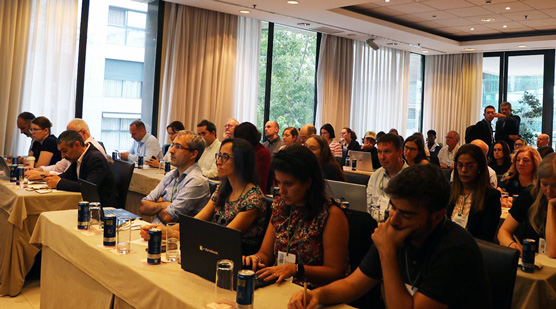GOVAQUA project collaborates actively with the EURO-INBO network of river basin managers in identifying and developing innovative water governance solutions.
The annual Europe-INBO conference in October 2023 hosted a workshop dedicated to water governance innovations by GOVAQUA and our sister projects InnWater and RETOUCH NEXUS. The workshop provided an opportunity for the participants to learn about innovative water governance practices thus far identified by the three projects and to provide their feedback.

The workshop on water governance held in in EURO-INBO Conference in Valencia 18 October 2023 gathered 70 experts and specialists. © INBO
Abundance of good water governance practices thrives in Europe and one aim of the workshop was to bring together examples of these. Innovation in water governance can be seen as an evolving practice that embraces new, not yet broadly applied solutions that could pave the way for a more adaptive and resilient water management.
Water governance innovations may relate to, for example, stakeholder participation, digital tools, economic instruments, or the Water–Energy–Food–Ecosystems Nexus approach that highlights the interdependence of water, energy and food security and ecosystems. In the workshop, real-world case studies from the three research projects offered a tangible connection to the issues at hand while an interactive working session fostered lively debate and brainstorming among attendees.
Examples from Spain
For example, in the Jucar River Basin case study in Valencia, Spain, the RetouchNexus project focuses on sustainable water management amidst challenges like climate change, water allocation conflicts, and ecological concerns, especially for L’Albufera wetland. Agriculture dominates water use (80%), followed by urban (14%) and industrial (6%) needs. The Water Court is an interesting example of effective traditional governance: an institution that dates back to medieval times still today plays a pivotal role in water distribution. The study highlights the necessity of integrating local customs and modern policies for adaptive governance, emphasizing stakeholder balance and resilience against intensifying droughts due to climate change.
In Spain's Axarquía region, the GOVAQUA project uses the DPSIR framework to analyse water governance, focusing on economic analysis and environmental impacts under Water Framework Directive analytical scheme. Key challenges in the region include excessive groundwater exploitation and seasonal fluctuations in demand, leading to innovative responses such as management and cost recovery for reused water and the future integration of desalination. The Living Lab process hosted by GOVAQUA prioritizes wastewater quality improvement, water allocation management and improved monitoring of groundwater resources. New innovative governance practices include pricing mechanisms, investment in advanced treatment, allocation planning, groundwater abstraction monitoring and policy, and stakeholder engagement to promote water use efficiency and mitigate crisis conditions caused by water scarcity and high demand.
Yearly workshops at EURO-INBO
The workshop gathered 70 experts and specialists working in basin management and in the implementation of the European Union´s Water Framework Directive, its "Daughter Directives" and other related regulation. The WaterGovernance 2027 synergy group will continue to host workshops in the forthcoming EURO-INBO conferences, sharing their findings and diving deeper into the topic.
Your insights are needed
The GOVAQUA project collected examples of innovative water governance practises at the workshop and this work continues now online. The online survey will be open until the end of February 2024. GOVAQUA´s researchers will use the responses to identify potential case studies for more in-depth analysis of good practices. The responses will also help the project to build a good practice repository.
More information about the EURO-INBO 2023 workshop: